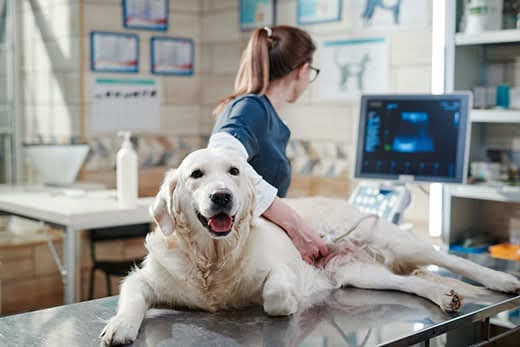
-
Find the right food for your pet
Take this quiz to see which food may be the best for your furry friend.
Find the right food for your pet
Take this quiz to see which food may be the best for your furry friend.
Featured products
 Adult Healthy Cuisine Roasted Chicken, Carrots & Spinach Stew Dog Food
Adult Healthy Cuisine Roasted Chicken, Carrots & Spinach Stew Dog FoodDelicious roasted chicken paired with tender vegetables in a succulent stew
Shop Now Small & Mini Savory Stew with Chicken & Vegetables Dog Food
Small & Mini Savory Stew with Chicken & Vegetables Dog FoodA delicious complement to the nutrition of Science Diet Small & Mini 7+ dog food
Shop Now Adult 7+ Perfect Digestion Chicken, Whole Oats & Brown Rice Recipe Dog Food
Adult 7+ Perfect Digestion Chicken, Whole Oats & Brown Rice Recipe Dog FoodScience Diet's breakthrough nutrition supports ultimate digestive well-being & healthy microbiome for dogs age 7+
Shop NowFeatured products
 Adult 7+ Senior Vitality Chicken & Vegetable Stew Cat Food
Adult 7+ Senior Vitality Chicken & Vegetable Stew Cat FoodImproves Everyday Ability to Get Up & Go
Shop Now Adult Savory Entrée Can Variety Pack Cat Food
Adult Savory Entrée Can Variety Pack Cat FoodPrecisely balanced nutrition with the delicious taste of savory minced chicken to help fuel the energy needs of cats during the prime of their life
Shop Now Adult 7+ Tender Tuna Dinner Cat Food
Adult 7+ Tender Tuna Dinner Cat FoodWith delicious chunks in a decadent gravy
Shop Now -
Dog
- Dog Tips & Articles
-
Health Category
- Weight
- Food & Environmental Sensitivities
- Urinary
- Digestive
- Joint
- Kidney
-
Life Stage
- Puppy Nutrition
- Adult Nutrition
- Senior Nutrition
Cat
- Cat Tips & Articles
-
Health Category
- Weight
- Skin & Food Sensitivities
- Urinary
- Digestive
- Kidney
-
Life Stage
- Kitten Nutrition
- Adult Nutrition
Featured articles
 Do Dogs and Cats have Belly Buttons?
Do Dogs and Cats have Belly Buttons?Learn whether cats & dogs have belly buttons like humans, what the function is, and if there are any health concerns associated with it.
Read More Why Are Dogs and Cats So Cute?
Why Are Dogs and Cats So Cute?If waggy puppy dog tails and furry kitten yawns make you swoon, you're not alone. Why are cats so cute? And, dogs too! Let's find out!
Read More Does My Pet Hate Me?
Does My Pet Hate Me?Learn tips for bonding with your pet if you've ever thought, 'My dog doesn't like me, or 'Why do I have a standoffish cat?'
Read More -


A pet cancer diagnosis can feel scary, overwhelming and devastating. Your veterinarian understands these emotions, as well as your worries about the future and the anxiety you might feel about treatment options. The good news is that advances in veterinary oncology result in cancer remission for many pets and improve their quality and quantity of life. If your furry family member has been diagnosed with cancer, this article can help guide you through the journey.
Pet Cancer Diagnosis
To confirm whether your pet has cancer, your vet will evaluate their overall health and run some tests. Preliminary testing often includes blood and urine tests, microscopic evaluation of cells or samples from any tumors, and imaging studies such as radiographs (X-rays) and abdominal ultrasounds. These tests provide basic information about your pet's health and help determine if cancer is present, the type of cancer and whether it has spread to other organs. This information allows your vet, or a vet certified in veterinary oncology, to give you a prognosis and recommend treatment.

Pet Cancer Treatment
The available pet cancer treatment options are much the same as cancer treatments for humans. The main difference is that pets tend to have fewer negative side effects with chemotherapy: They rarely get nauseated or lose their hair. Your pet is likely to have a better chance of survival if you follow the treatment plan laid out by your vet, which can include one or more of the following therapies.
Surgery
Surgery is used to remove cancerous growths and may be curative with some cancers, such as in complete removal of a low-grade mast cell tumor. Surgery can also be used in conjunction with other treatments to completely remove cancer from your pet's body.
Chemotherapy
This method uses medication to kill cancer cells and is part of most cancer treatment plans. Chemotherapy drugs can be taken orally in pill form or administered intravenously by a veterinary professional.
Radiation
Radiation is used to shrink tumors before surgery, kill cancer cells that are left behind after surgery and slow down cancer growth in parts of the body where surgery isn't possible — in the nose, for example. Pets usually require several doses of radiation.
Immunotherapy
Immunotherapy uses a vaccine to stimulate a pet's immune system to fight off cancer cells. This therapy is used in canine melanoma and is being explored as an option to treat osteosarcoma.
Palliative Care
Pet cancer can't always be cured. Palliative care focuses on maximizing your pet's quality of life during the time they have. This may involve controlling pain, minimizing nausea and helping you understand when it's time to say goodbye. Palliative surgery may be used to stop pain, especially in dogs diagnosed with bone cancer. Also, a conversation with your veterinarian about suggested nutrition & food during a palliative phase is important. The silver lining is that palliative care can often provide weeks to months of quality pain-free time with your pet you might not have otherwise had — and that's truly precious.


Tasty Tips
Young pets may need several visits in their first year for vaccinations. Adult pets generally benefit from annual check-ups, while senior or special-needs pets might require more frequent visits.
What to Expect When Your Pet Has Cancer
Depending on the type of cancer your pet has, their overall health and age and the treatments they're receiving, there may be some changes at home. For example:
- If your pet has had surgery, they'll need time and at-home care to recover.
- Your pet may sleep more and eat less if they have a type of cancer that causes loss of appetite or energy. Don't push them to exercise, and let them self-regulate their activity. If you have a dog, continue to take them outside daily for fresh air and sunshine. If your pet isn't eating, your vet may prescribe an appetite stimulant or change their food.
- If your pet has brain cancer, you might notice changes in cognition such as loss of learned behaviors. They may also develop seizures, which will need to be managed with medication.
- Cancer or cancer treatments can sometimes cause urine or bowel control issues, requiring more frequent potty breaks or diapers.
- Expect frequent veterinary visits. If your pet is receiving treatment, your vet will need to do additional testing during and after treatment to assess how well it's working.
When your pet is under palliative care, it can be hard to know when they need veterinary intervention and when it's time to say goodbye. Lap of Love has a quality-of-life assessment tool that can help. The concept of caregiver burden in humans caring for other sick humans is well documented, but according to Psychology Today, it's also real in people who are caring for chronically ill pets. If you're the caregiver, take care of yourself and enlist support where you can. Organizations such as PrizedPals can help you form a circle of support when you need it most.
A pet cancer diagnosis can be overwhelming, but your vet is here to help you navigate the process. Grieving is also a normal part of dealing with pet cancer. If you're struggling, consider reaching out to a licensed therapist to help you cope so you can make the most of the time you have left with your precious pet.


Dr. Sarah Wooten graduated from UC Davis School of Veterinary Medicine in 2002. A member of the American Society of Veterinary Journalists, Dr. Wooten divides her professional time between small animal practice in Greeley, Colorado, public speaking on associate issues, leadership, and client communication, and writing. She enjoys camping with her family, skiing, SCUBA, and participating in triathlons.
Related products

Supports energy level and beautiful fur in mature cats

Improves Everyday Ability to Get Up & Go

Precisely balanced nutrition with the delicious taste of savory minced chicken to help fuel the energy needs of cats during the prime of their life

With delicious chunks in a decadent gravy
Related articles

Learn whether cats & dogs have belly buttons like humans, what the function is, and if there are any health concerns associated with it.

If waggy puppy dog tails and furry kitten yawns make you swoon, you're not alone. Why are cats so cute? And, dogs too! Let's find out!

Learn tips for bonding with your pet if you've ever thought, 'My dog doesn't like me, or 'Why do I have a standoffish cat?'

Discover how your pets might be impacted by the loss of another. Learn how to recognize their signs of grieving & how to help them cope with their loss.

Put your pet on a diet without them knowing
Our low calorie formula helps you control your pet's weight. It's packed with high-quality protein for building lean muscles, and made with purposeful ingredients for a flavorful, nutritious meal. Clinically proven antioxidants, Vitamin C+E, help promote a healthy immune system.
Put your pet on a diet without them knowing
Our low calorie formula helps you control your pet's weight. It's packed with high-quality protein for building lean muscles, and made with purposeful ingredients for a flavorful, nutritious meal. Clinically proven antioxidants, Vitamin C+E, help promote a healthy immune system.

